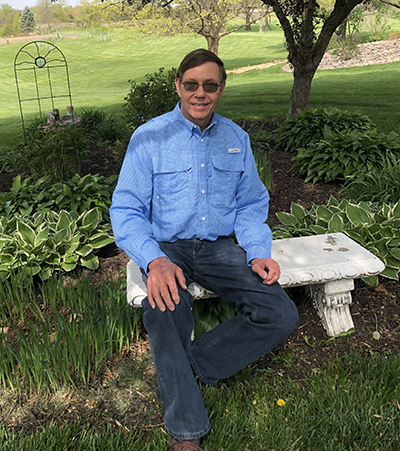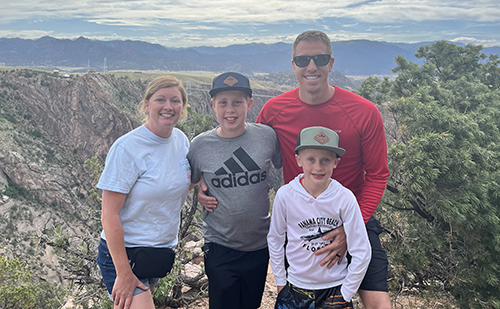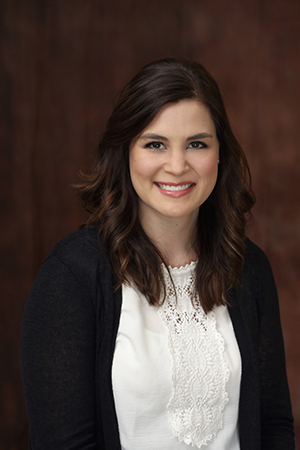As patriarch of the family, Ron Kasparie has spent the past 42 years sharing with his loved ones the importance of faith, family, a strong work ethic and the importance of regular skin cancer screening.
Skin cancer screening?
“They are probably getting tired of me telling them,” he said.
 At 68-years-old, Ron has had numerous areas of basal cell skin cancers, the most common form of the disease, removed from his face and back. So many in fact that years ago he began seeing a dermatologist on an annual basis to better protect his health. He believes a career working outdoors in construction, and growing up in the 1950s and 60s, increased his risk for skin cancer.
At 68-years-old, Ron has had numerous areas of basal cell skin cancers, the most common form of the disease, removed from his face and back. So many in fact that years ago he began seeing a dermatologist on an annual basis to better protect his health. He believes a career working outdoors in construction, and growing up in the 1950s and 60s, increased his risk for skin cancer.
“I was always playing outside,” Ron said. “We had no such thing as sunscreen. It was usually shorts, no shoes and no shirt. You got suntans and sunburns.”
Ron’s commitment to his skin health as an adult more than likely saved his life in June 2020, during his annual visit with Blessing Health board-certified dermatologist, Elise Scoggin, DO.
“It was a spot on the arm,” Ron recalled. “I didn’t know what it was. It was just kind of an irritating spot that had a little bump in it the size of a small pea.”
That irritating spot was a rare and aggressive form of skin cancer on Ron’s left wrist, known as Merkel Cell cancer (MCC).
“Possibly the scariest feature of MCC is that it can mimic other benign growths of the skin and go undetected until it becomes more invasive,’” Dr. Scoggin said.
“That is why I stress to my patients that they should be looking out for signs and symptoms that include itching, burning or bleeding, or simply something that is just not behaving ‘normally’ on their skin. Frequent, full skin examinations can also help us detect MCC and other skin cancers earlier,” she continued.
In addition to Dr. Scoggin, Ron’s MCC treatment team included Blessing Health doctors Emmanuel Bessay, surgeon; Mohammed Memon, medical oncologist; and Robert Johnson, radiation oncologist. The cancer was removed and six weeks of radiation therapy applied. Ron’s recent scan showed no evidence of MCC, and he has had no reoccurrence of basal cell cancers for six months.
“Very thorough,” Ron said of Dr. Scoggin’s care. “I would recommend her, and I have to anyone who asks me.”
Meet Matt Kasparie

Among the people Ron has recommended to Dr. Scoggin for annual screenings are his wife and two sons. Like Ron, his wife has a history of basal cell skin cancers, while his oldest son Eric has a clean bill of skin health to this point. Youngest son Matt – 37 years old – has not been as fortunate as his brother.
“During my annual visit in 2021, Dr. Scoggin found a spot on my face that I thought was nothing,” Matt said.
A biopsy showed the spot on Matt’s face was melanoma skin cancer. Melanoma is usually curable when detected and treated early. Once it has spread deeper into the skin or other parts of the body, it becomes more difficult to treat and can be deadly.
Matt says Dr. Scoggin was very comforting and informative as she delivered his diagnosis, and skilled at removing the cancer. “If I didn’t tell you it was there, I don’t think you could even find the scar on my face. She did a really good job.”
No follow-up treatment was required.
Matt’s wife also has a family history of skin cancer, and they are the parents of two young boys who are well educated on the need for sun block, and to cover up other exposed skin from the sun’s rays.
“They’ve seen some of the spots I’ve had removed, and the spots their Grandpa went through,” Matt says of his sons. “They are okay doing what we tell them to protect their skin. They don’t fight it.”
And just as in his dad’s case, Matt’s commitment to his annual skin cancer screenings may well have saved his life, and continue to do so.
“If I go in with any tan lines, and Dr. Scoggin sees that – even if it is from my watch – she usually gives me a talking to about the precautions I need to take. She keeps me going.”
Lessons learned
The Kasparie family stresses the need to use sun block, wear long sleeved shirts and wide brim hats to protect your skin, and have annual skin cancer screening.
“If I would not have been doing the screenings, if Dr. Scoggin wouldn’t have caught it, I don’t know what my outcome would have been but I don’t think it would have been as near as good as it was,” Ron said of his Merkel Cell cancer in particular.
“It is not a fun experience having spots removed from you,” Matt added. “If you can avoid it, avoid it.”
“Though the Kasparie family cannot change their genetics, they are doing everything they can to reduce their risk,” Dr. Scoggin said.
“I feel some people think dermatologists want people to avoid the sun. I tell my patients that I want them to enjoy life and that means being outdoors. However, there are ways to cover your skin with sunscreen and wearing sun protective clothing and gear.”
“I know Ron’s family enjoys a lot of lake time during the summer and Matt’s kids are very involved in outdoor sports, yet they make it a point to integrate sun protection into their life. If there’s a will, there’s a way,” she concluded.
Free skin cancer screenings
 Blessing Health is hosting two free skin cancer screenings in May. Registration is required on line at events.blessinghealth.org, or by calling 877-411-2468.
Blessing Health is hosting two free skin cancer screenings in May. Registration is required on line at events.blessinghealth.org, or by calling 877-411-2468.
The first screening is Friday, May 19 at Blessing Dermatology, 1132 Broadway in the HomeBank building, Quincy, with Dr. Scoggin. Appointments are available between 8 am and Noon.
The second free screening is Tuesday, May 23, at Blessing Health Hannibal (formerly Hannibal Clinic), with board certified dermatologist, Susan Meidl, MD, FAAD. Appointments are available between 5 and 7 pm.
For more information on dermatology services at Blessing Health, go to blessinghealth.org/dermatology.
